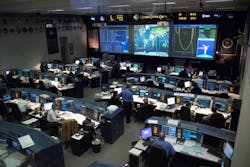Air Force asks industry to develop human-machine interface for machine autonomy in satellite control
KIRTLAND AIR FORCE BASE, N.M. – U.S. Air Force researchers are asking industry to develop new kinds of human-machine interfaces to enable machine autonomy in reconnaissance satellite control that could enhance global surveillance capabilities.
Officials of the Space Control Technology Branch of the air Force Research Laboratory Space Vehicles Directorate at Kirtland Air Force Base, N.M., released a solicitation (FA9453-21-S-0001) on Wednesday for the Space Technology Advanced Research - Fast-tracking Innovative Software and Hardware (STAR-FISH) project.
The solicitation involves call four of the STAR-FISH project -- Human to Machine Interface for Autonomous Satellite Systems -- which seeks to enable seamless and agile human-machine interaction by establishing trust among satellite operators, and to boost satellite autonomy capabilities with advanced human-machine interface technology.
Air Force researchers seek to collaborate with industry to develop and integrate game-changing space capabilities by developing a new human-machine interface for autonomous satellite systems.
Related: Artificial intelligence and machine learning for unmanned vehicles
This collaboration is expected to enable the U.S. Air and Space forces to optimize machine autonomy and decision support with new features in advanced human-machine interfaces for satellite control.
Researchers are asking industry to submit white papers that outline human-machine interface concepts for autonomous satellite systems, as well as ways to modify existing satellite autonomy and control technologies.
As an example, researchers could set up one or more satellites in test beds to perform an inspection or docking orbit around another cooperative satellite. The system is envisioned to have three controllers: a primary automatic or autonomous controller; a backup controller provided through a run time assurance wrapper; and a human operator.
In addition to these automatic controllers, the human operator will be able to override with a scripted command. The run time assurance watches the primary controller and scripted controller, and intervenes with a backup control when it detects a need to intervene to prevent satellite collisions and maintain satellite camera pointing restrictions.
Related: Future deep-sea UUVs with machine autonomy are focus of DARPA Angler program
This training scenario will help scope the prototype human-machine interface work for this contract to create an intuitive human-machine interface that facilitates understanding and projection of the autonomous controller while making the most the directability and shared awareness among the human operator and the satellite autonomy capability.
This human-machine interface will be written in a widely available programming language such as Javascript, Java, Python, C, or C++; describe the physical characteristics of the operator interface, control, and design approach; provide transparency of autonomous control algorithms to include current state and projected future state; display run-time assurance outputs such as status of failure and interlock conditions; provide data to the autonomous controller such as fuel limits per mission, fuel limits per maneuver, time limits, optimal time to complete, and illumination requirements; and will display autonomous outputs such as status of failure and interlock conditions.
Industry white papers must describe the overall approach for developing a human-machine interface for an autonomous satellite; and software issues such as virtualized or containerized software using an industry-standard virtualization or containerization technology such as Docker.
Those submitting promising white papers will be invited to submit formal proposals. Companies interested should upload white papers no later than 9 May 2022 to DoD Safe online at https://safe.apps.mil.
Related: Robotic technologies for the future land warrior
Email contract specialist Avion Lourde at [email protected] at least three days before uploading to get a DoD Safe drop-off request.
Email questions or concerns to Avion Lourde at [email protected]; Robert Jefferis at [email protected]; Michelle Simon at [email protected]; or Michael Lopez at [email protected].
More information is online at https://sam.gov/opp/87dd122fc73e415d8f9c23682177bfc1/view.
About the Author
John Keller
Editor-in-Chief
John Keller is the Editor-in-Chief, Military & Aerospace Electronics Magazine--provides extensive coverage and analysis of enabling electronics and optoelectronic technologies in military, space and commercial aviation applications. John has been a member of the Military & Aerospace Electronics staff since 1989 and chief editor since 1995.
